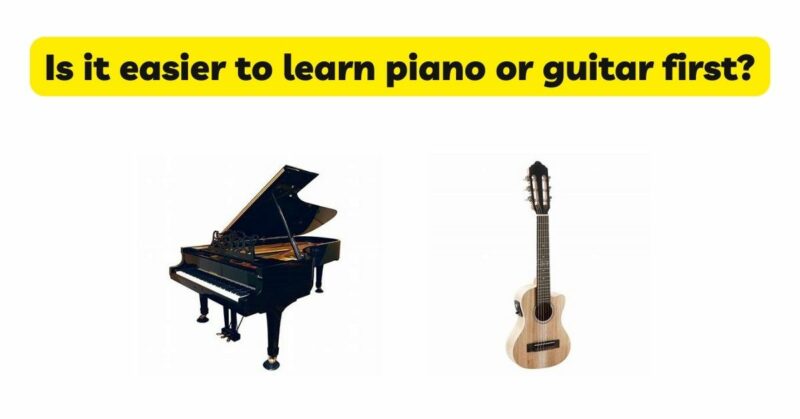Embarking on a musical journey is an exciting endeavor, and choosing the right instrument to start with is a significant decision. For many aspiring musicians, the choice often boils down to learning either the piano or the guitar. Each instrument offers its own set of challenges and rewards. In this article, we will explore the factors that may influence the decision of whether to learn the piano or the guitar first. By examining factors such as playing technique, music theory, instrument complexity, and personal preferences, we can determine which instrument may be easier to learn as a beginner.
- Playing Technique: One of the key factors to consider when determining the ease of learning an instrument is the playing technique involved. The guitar requires the development of finger dexterity, as well as the ability to strum or pluck the strings. Learning basic chords and strumming patterns can provide beginners with quick satisfaction and the ability to play recognizable songs. The piano, on the other hand, demands coordination between both hands, with the fingers independently navigating the keys. While initial coordination may be challenging for some, the piano’s layout provides a visual representation of music theory concepts, which can aid in understanding musical structures.
- Music Theory: Music theory is an essential aspect of learning any instrument. The piano offers a unique advantage in this regard. Its linear layout and clear visual representation of notes make it easier to grasp concepts such as scales, chords, and intervals. As beginners progress on the piano, they naturally develop a solid understanding of music theory. In contrast, the guitar’s non-linear layout and the need to memorize chord shapes can make it initially more challenging to grasp theoretical concepts. However, both instruments require an understanding of music theory to progress beyond the basics, and dedicated learning can help overcome any initial hurdles.
- Instrument Complexity: Another aspect to consider when assessing the ease of learning an instrument is its inherent complexity. The guitar, with its portability and limited number of strings, can be perceived as more accessible to beginners. Basic chords can be learned relatively quickly, allowing beginners to strum along to their favorite songs. However, mastering the guitar’s intricacies, such as fingerpicking, advanced chord voicings, and soloing, can be a lifelong pursuit. On the other hand, the piano’s range, the requirement for both hands to work independently, and the need to read music simultaneously can present a steeper learning curve initially. However, the piano’s linear layout and standardized key sizes provide a more consistent playing experience across different instruments, which can aid in overall progress.
- Availability of Learning Resources: The availability of learning resources and instructional materials can significantly impact the ease of learning an instrument. The guitar enjoys immense popularity and has a vast array of resources, including online tutorials, chord charts, and songbooks. Beginner-friendly guitar methods and lessons are abundant, making it easier for aspiring guitarists to access learning materials. The piano, too, offers a wealth of learning resources, with a wide range of beginner-level books, video lessons, and online tutorials available. However, the piano’s notation system may present an initial challenge for beginners who are not yet familiar with reading sheet music.
- Personal Preferences and Musical Goals: Ultimately, personal preferences and musical goals play a crucial role in deciding which instrument may be easier to learn first. Consider the musical styles that resonate with you the most. The guitar is versatile and well-suited for genres such as pop, rock, folk, and blues. If your musical interests lie predominantly in these genres, starting with the guitar may align better with your preferences. On the other hand, the piano’s versatility allows for exploration across a wide range of musical genres, including classical, jazz, and contemporary. If you aspire to dive into classical music, jazz improvisation, or have a strong inclination towards keyboard-based genres, the piano may be a more fitting choice.
- Patience and Motivation: Learning any instrument requires patience, dedication, and consistent practice. The instrument you choose to learn first should be one that motivates and inspires you to practice regularly. While the guitar may offer quicker gratification with the ability to play simple chords and strumming patterns early on, progressing beyond the basics can require perseverance. The piano’s initial challenges may demand more patience in developing hand coordination and reading sheet music. However, the joy of playing complex melodies and harmonies on the piano can be a strong motivating factor for some.
Conclusion: Choosing between learning the piano or the guitar first depends on various factors, including playing technique, music theory, instrument complexity, learning resources, personal preferences, and musical goals. While the guitar may offer quicker satisfaction with its accessible chords and strumming patterns, the piano provides a solid foundation in music theory and a clear visual representation of musical concepts. Ultimately, the ease of learning an instrument is subjective and dependent on the individual’s dedication, patience, and motivation. The most important factor is to choose an instrument that resonates with you and ignites your passion for music. Both the piano and the guitar can provide a fulfilling musical journey, and the choice of which instrument to learn first is a personal one that should align with your musical aspirations and preferences.


